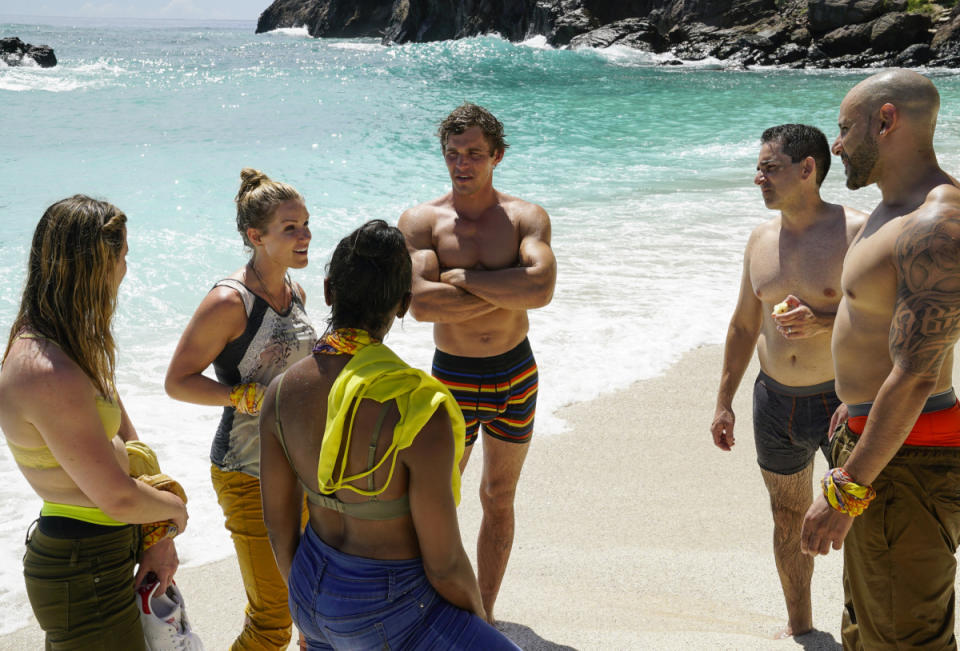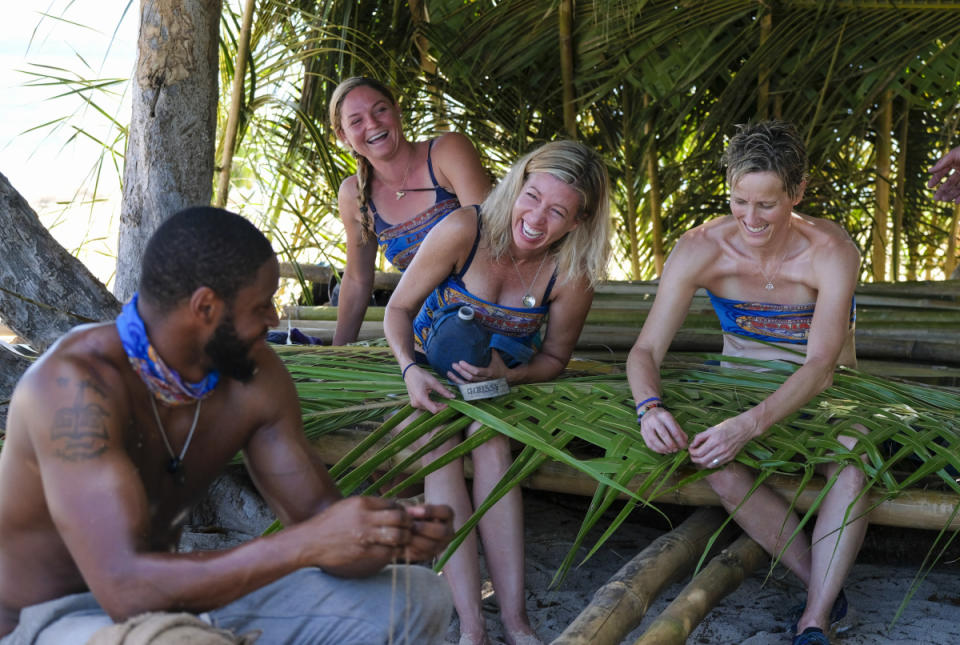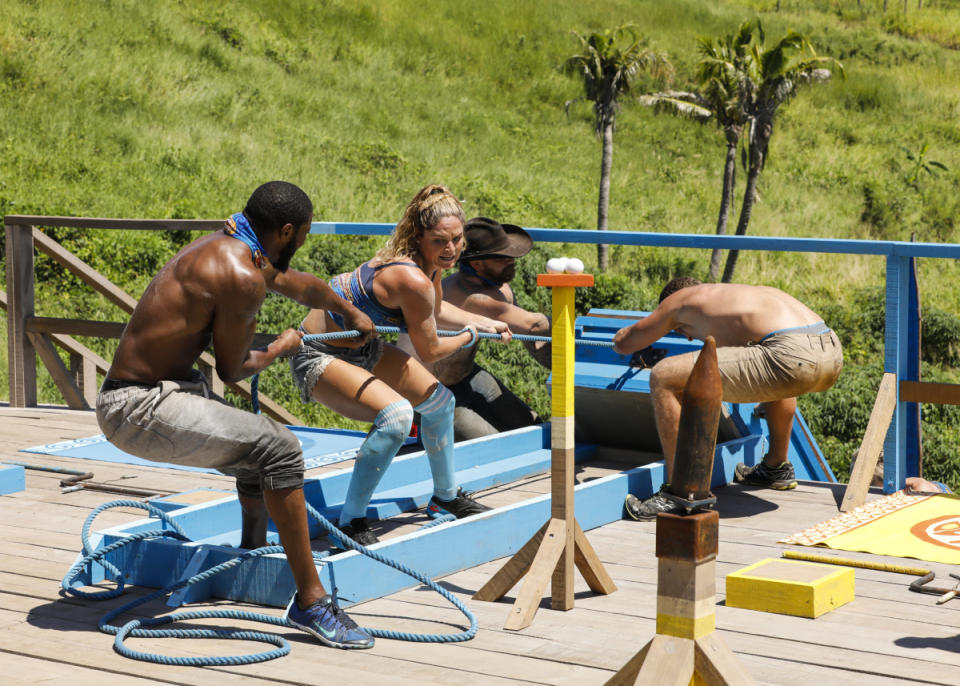'Survivor: Heroes v. Healers v. Hustlers' premiere recap: A hero without a cape

Warning: This recap for the “I’m Not Crazy, I’m Confident” episode of Survivor: Heroes v. Healers v. Hustlers contains spoilers.
For years Survivor trekked all over the globe visiting some of the world’s most exotic locales like a trust-fund kid on a never-ending gap year — from the desert plains of Africa to the bug-infested jungles of the Amazon to the Mayan temples of Guatemala, where greedy castaways scarfed down on the carcass of a ritualistically burnt chicken. The cultural aesthetic of a season was a large part of Survivor‘s appeal in the early years but has fallen by the wayside recently, as the show now tends to focus primarily on strategy and game play. Nowadays, one tropical beach location is indistinguishable from the next, so the move to make Fiji the permanent home of Survivor makes a lot of sense.
Survivor: Heroes v. Healers v. Hustlers is the show’s 35th season and the third in a row to film in Fiji’s Mamanuca Islands. As a location, Fiji offers everything Survivor needs in terms of glorious weather, golden beaches, and a beautiful blue ocean for water-based challenges. I don’t have a problem with the show reusing a location if it means keeping down costs and producing more seasons for years to come. But the one obvious drawback in the repeat destination is the increasingly ridiculous themes — evidenced by this season’s mouthful of a title. Unable to just slap the name of the country on the logo and have done with it, producers have to come up with elaborate themes to sell the season. It started with last year’s Zeitgeisty Millennials vs. Gen-X, but as corny as that was, at least the division made sense. Heroes vs. Healers vs. Hustlers, on the other hand, sounds like it was on the side of the writers’ room whiteboard next to Hotties v. Hippies v. Hermits and only made the cut thanks to a fortunate coin flip.
WHAT’S IN A THEME?
The 18 new castaways look equally as dumbstruck when Jeff Probst explains the theme to them during the marooning. “You’ve been divided into three tribes based on the positive traits most associated with you by others,” Probst clarifies, as bellhop Ryan wonders if anyone has ever described him as a “hustler” while telling him to carry their luggage. “The Heroes tribe,” Jeff continues, “are heralded for your courage, your achievements or your ideals” — the tribe includes an ex-Marine, an NFL player, and a Financial Analyst, the holy trinity of heroism. The Healers tribe supposedly “receive[s] gratitude for their acts of service in helping others heal their physical or emotional pain” and is made up mainly of therapists and nurses, as opposed to mystic shamans armed with healing crystals, which would have been much more entertaining. The tribe does feature sex doctor Mike, though, who immediately slips in a penis joke in his first confessional of the season.
Perhaps the most ramshackle group, at least in the early going, is the Hustlers tribe. “You are respected for your hard work ethic. Your mantra is ‘get it done no matter what, 100 percent of the time,'” Probst tells the confused faces looking back at him. Ali, a personal assistant to a YouTube star, the most soul-crushing job in the universe, tries her best to apply her career to Probst’s description. The tribe also includes surf-bro Devon, whose closest association with the word “hustler” probably comes in the form of a monthly magazine subscription. But the worst thing for this tribe is the connotation of the word “hustler” itself, at least in the context of Survivor. Despite Probst’s positive spin, when you think of a hustler you picture a grifter at a bar sniffing around the pool table waiting to scam innocent patrons out of their money. When you apply that same label to Survivor, you’re immediately going to assume “game player” or someone willing to lie and deceive. It certainly doesn’t conjure up respect or loyalty or trustworthiness in the way that Hero or Healer does.
Although the themes almost always become irrelevant once the tribes have swapped, in the beginning the label thrust upon you can really shape both your outlook as a player and the perception the other players have on you. The way Probst sells the theme to the eager-to-please castaways is like some kind of brainwashing torture exercise. Before you know it, players are speaking at length about their lives as hustlers or healers as if they live by those values day-to-day. For the most glaring example, look back at Survivor: Worlds Apart and how castaways started referring to their “no collar” lifestyle — a term that Probst only had made up a only few months earlier after one too many cups of coffee. It’s fascinating to watch which players accept their CBS-approved branding and which of them push back against it.

COMMUNICATION IS KEY
The Healers are all about their title. Social worker Roark is especially gung-ho, waving the flag for the Healers’ ability to communicate and work as a team. It’s those traits Roark credits for their success in the opening mini-challenge, which sees the tribe win a full fire-making kit. Physical therapist Desi later backs up this assertion, commenting about how communication is essential in this game. For the most part, the Healers do seem to be connecting well, both at camp and in the challenges. There are already signs of romance between wilderness therapy guide Cole and nurse Jessica, and if there is going to be a hookup anywhere on the island, then where better than on the tribe with the sex doctor?
Speaking of Dr. Mike, he’s the one guy on the Healers tribe failing to communicate his intentions adequately, at least when it comes to probation officer Joe — a sort of Tony Vlachos look-alike without the charm. Mike says that his 10-year-old son told him he needs to look for the idol, so that’s what he sets about doing under the guise of checking on the fire. However, he’s soon pounced upon by Joe, who accuses Doctor Strangelove of having the idol and forces him to empty his pockets like he’s running down a common criminal. It’s the first of many moments of idol paranoia throughout the episode. Mike adamantly denies having the idol, although he wishes he did, and leaves the exchange feeling bullied and distrusting of Joe.

LOSING THE HERO CAPE
Over on the Heroes tribe, the initial approach is strength and unity. The tribe quickly gets to work on the shelter while lifeguard Ashley talks up the heroic values of her fellow castaways. But just when you think this is going to be the one-dimensional “respect and honor” tribe, Ashley mentions the “hero cape” falling off and the need to make alliances. The reference of a “hero cape” brought back memories of the original Heroes tribe from the iconic Heroes vs. Villains season, where James Clement referred to Colby Donaldson as “Superman in a fat suit.” Ashley approaches firefighter JP and cements an alliance with the hopes of bringing the “cowboy” on board. That cowboy in question is ex-Marine Ben, who also solidifies a coalition with NFL cornerback Alan.
Alan clearly didn’t even bother to pack his hero cape because he comes in playing full-tilt boogie with seemingly no intention to act honorably. He agrees to a “core four” alliance with Ben, Ashley, and JP, with the “Mom Squad” of Chrissy and Katrina on the outs, but he lets us know that he’s suspicious of Ashley and JP and the closeness they’ve developed. It’s at this point where the one-hour premiere begins to hurt the show, as it feels like big story beats are missing that could have presented a much smoother narrative had this been a regular 90-minute premiere. This problem becomes even more apparent later in the episode, when Alan decides to up his paranoia to almost Brandon Hantz levels.
KICKING INTO GEAR
After a paddling mishap and an initial challenge loss, the Hustlers tribe regroups and sets about fulfilling their chosen gimmick of “the hard workers.” Fisherwoman Lauren, the voice of the Hustler grit and determination, talks about kicking into gear and working on the shelter. Meanwhile, Ali focuses on building alliances, her first choice being sunburn victim Patrick, an odd pick given that our introduction to the small business owner was him considering whether to eat a stick insect. The Ali/Patrick alliance makes more sense having read the Hollywood Reporter pregame interviews, as Ali explains that she actually knows Patrick — they both attended Auburn University at the same time and lived opposite each other. A strange coincidence and one that is unlikely to be referred to on the show, but worth knowing nonetheless.
WHAT IS GOING ON?
I mentioned the idol paranoia earlier, and it’s something that dominates this episode and makes the game play just as perplexing as the theme. In fact, right off the boat there is suspicion and accusations and scrambled alliances. It’s the kind of action you expect weeks into the game or at the start of an all-star season, not during the early days of what should be tribal bonding and shelter building.
The paranoia is perhaps spurred on by a Secret Advantage, which Ryan snatches during the mad dash for supplies at the marooning. It doesn’t appear anyone catches the turtleneck-wearing bellhop in the act, but later on, Patrick refers to the advantage and whether or not someone has found it. Patrick’s suspicions are likely a result of last season’s advantage-laden season and the expectation that those sorts of twists are bound to happen. That’s another issue I have with too many powers in the game: It turns people’s suspicions meta rather than based on more interesting social dynamics.

Ryan’s advantage is a Super Idol that can be played after the votes are read, but the twist is that it can only be used at the first tribal council. If Ryan doesn’t attend the first tribal, then he must secretly will it to another player on the losing tribe. I’ve never been a fan of the Super Idol, as it wields way too much power, but the fact it’s a one-and-done deal here makes it somewhat more palatable. Ryan, knowing that the idol has a limited shelf life, smartly uses it to form a bond with Devon, recognizing the surf instructor as his polar opposite and someone people wouldn’t suspect him to work with. By promising to use the idol on Devon if need be, Ryan immediately gains trust and solidifies a strong pair.
But while Ryan is putting his real idol to good use, back at the Heroes camp, Alan is causing chaos with an imaginary idol. This is another moment where it felt like we missed a significant portion of the buildup, because suddenly in the dead of night Alan accuses Ashley and JP of having an idol. Alan’s allegations are so relentless that JP winds up stripping to his bare butt cheeks to prove his innocence — for a second I thought we were about to see a full cavity search. How about that for a #SurvivorFirst? In a confessional, Alay says he doesn’t genuinely believe JP has an idol; he’s just trying to throw suspicion on the pair, but all it seemed to achieve was painting a target on his own back.

IT WAS SUPPOSED TO BE SIMPLE
Alan’s beef with Ashley and JP shapes the remainder of the episode, as the Heroes tribe lose the first Immunity Challenge in a close showdown with the Hustlers tribe. Chrissy, who collapses and throws up post-challenge, becomes the beneficiary of Ryan’s Super Idol, which is waiting for her in her bag back at camp. Knowing that she was on the outs, the advantage is a welcome security blanket for the Financial Analyst. The question now becomes, does she use it?
Going into the first tribal council of the season, it seems like the vote is up in the air. Originally the plan was simple, Chrissy or former Olympian Katrina, both secluded for daring to be older women on Survivor. But as Ben says, that strategy was blown up because of Alan’s vendetta against Ashley and JP, and now that he’s found himself in the middle, he and Alan could swing to the “Mom Squad” and vote out Ashley or stick with the original plan and take out one of the older ladies. Then there is also the possibility that Alan’s paranoia will explode and cause everyone just to blindside him now rather than put up with his erratic antics.

But in the end, the result is super-anticlimactic. Despite Alan’s continued insistence that Ashley and JP have an idol or at the very least a clue to an idol, the tribe votes as a unit 5-1 against Katrina, who barely received any airtime. Initially, I wondered why Chrissy didn’t play her idol for Katrina, but seeing that everyone voted the same way, it appears the edit was largely a misdirection and that a solid plan was in place before tribal council. How much of Alan’s shenanigans were smoke and mirrors? It remains to be seen, but I couldn’t help feeling a bit cheated by the time the credits rolled. The Heroes looked to be playing against archetype but in the end stuck with the predictable “Keep the tribe strong” mantra. The hero cape is still tucked in for now.
It’s still in the early days, and while nothing in this episode set my world alight, I will give the show some leeway, considering it had to pack the opening three days into a 42-minute running time. I hope that as the game develops and more players rid themselves of the shackles of their production-assigned labels, we will see more personality and more dynamic game play.
PLAYERS OF THE WEEK
Ryan: The obvious choice. His move with the idol to secure Devon’s trust was done smoothly and effectively.
Ali: Not much to go on, but Ali appeared to have a good grip on the early dynamics and formed an alliance with Patrick. How long that relationship lasts is another question.
Ben: Perhaps the most logical person on the Heroes tribe, everybody seems to trust him, and that speaks well for his social game.
Survivor airs Wednesdays at 8 p.m. on CBS.
